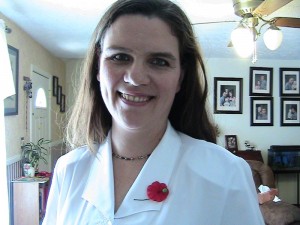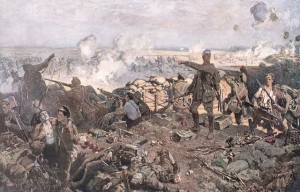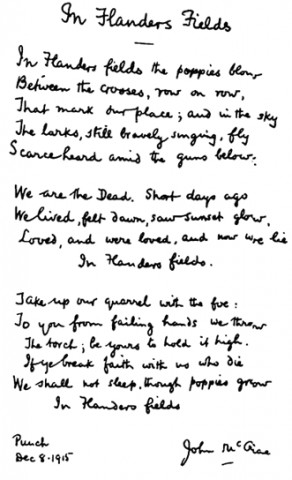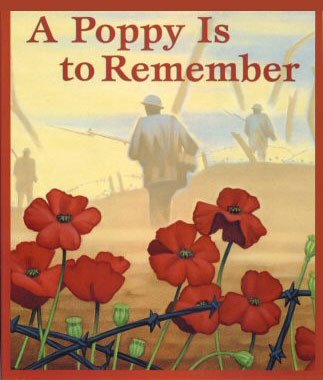Flanders Poppies
 During this busy weekend, did you see VFW (Veterans of Foreign Wars) members at intersections giving away red “Buddy Poppies” for donations? Did you get one? Did you wear it?
During this busy weekend, did you see VFW (Veterans of Foreign Wars) members at intersections giving away red “Buddy Poppies” for donations? Did you get one? Did you wear it?
The VFW veterans are not an unaccustomed sight during the Memorial Day weekend, but do you know what the poppies mean? Do you know the story for the poppy being a symbol of remembrance for our war dead?
One of the worst battles in the first world war was called the Second Battle of Ypres, which took place at the Ypres Salient near Ypres, Belgium. A salient is a military term for a battlefield that projects into enemy territory. The Ypres Salient was surrounded on three sides by the enemy. This battle was an introduction to trench warfare as both sides “dug in” for the battle, and also the one of  first uses of gas on the battlefield. It was a horrible, hellish battle. The Allies (Belgiums, French, British, and Canadians) won the battle, but at a loss of 75% of their men. 6,000 men died within the first ten minutes of the battle due to the chlorine gas launched by the Germans, and another 4,000 men died during the 17 days. Imagine that. 10,000 Allies dead.
first uses of gas on the battlefield. It was a horrible, hellish battle. The Allies (Belgiums, French, British, and Canadians) won the battle, but at a loss of 75% of their men. 6,000 men died within the first ten minutes of the battle due to the chlorine gas launched by the Germans, and another 4,000 men died during the 17 days. Imagine that. 10,000 Allies dead.
LTC John McCrae was serving as a doctor for the Canadian Army. Despite being a veteran of the South African War, LTC McCrae said of the 17 days he spent in Ypres Salient, “I wish I could embody on paper some of the varied sensations of that seventeen days… Seventeen days of Hades! At the end of the first day if anyone had told us we had to spend seventeen days there, we would have folded our hands and said it could not have been done.”
He saw so many dead and so many wounded, witnessed unimaginable terror in those long two-and-a-half weeks. Among the thousands and thousands dead, one of them struck a personal chord within him. On May 2, 1915, a friend and former student, Lieut. Alexis Helmer of Ottawa, died from a shell burst. Because there was no chaplain available, LTC McCrae performed the funeral ceremony, burying Lieut. Helmer that day in a small cemetery just outside of LTC McCrae’s dressing station.
 The next day, he wrote the poem, “In Flanders Fields.” He sat in the back of an ambulance, and took 20 minutes out of precious downtime to scribble the poem out. From where he sat, he could see wild poppies growing out of a ditch.
The next day, he wrote the poem, “In Flanders Fields.” He sat in the back of an ambulance, and took 20 minutes out of precious downtime to scribble the poem out. From where he sat, he could see wild poppies growing out of a ditch.
A 22-year-old sergeant major, Cyrill Allison, was delivering mail and approached LTC McCrae. McCrae looked up when he approached, but then went back to writing the poem. When he was finished, he handed his notbook to the sergeant major and took the day’s mail from him.
“His face was very tired but calm as he wrote,” Allinson later recalled. “He looked around from time to time, his eyes straying to Helmer’s grave…The poem was exactly an exact description of the scene in front of us both. He used the word blow in that line because the poppies actually were being blown that morning by a gentle east wind. It never occurred to me at that time that it would ever be published. It seemed to me just an exact description of the scene.”
The poem was published on December 8, 1915, and with the poppy has become an icon of remembering the war dead world-wide.
I pray that you have a blessed and safe Memorial Day. I hope that you take some time today to remember what this holiday is about, and think back to the men and women who have died while serving our country. I hope that you are able to purchase a Buddy Poppy and wear it to honor our war dead. And if you get a chance, tell your kids about the wild poppies that grew in the trenches in a salient in Belgium.
In Flanders Fields
 By: Lieutenant Colonel John McCrae, MD (1872-1918)
By: Lieutenant Colonel John McCrae, MD (1872-1918)
Canadian Army
In Flanders Fields the poppies blow
Between the crosses row on row,
That mark our place; and in the sky
The larks, still bravely singing, fly
Scarce heard amid the guns below.
We are the Dead. Short days ago
We lived, felt dawn, saw sunset glow,
Loved and were loved, and now we lie
In Flanders fields.
Take up our quarrel with the foe:
To you from failing hands we throw
The torch; be yours to hold it high.
If ye break faith with us who die
We shall not sleep, though poppies grow
In Flanders fields.


Great post! Here in Canada, the poppy is the most recognizable symbol of remembrance and everyone wears one here for Remembrance Day, which is held on Nov. 11th. I am a teacher and each year, as part of our school tribute to Remembrance Day, a child or a class shares this poem – it is so incredibly moving.
Have you ever seen this video? http://www.youtube.com/watch?v=KYlrrAWCTRg It is a standard view here around Remembrance Day as well. Our minister often shows it at church.
I have seen that video! That’s awesome that it’s become a standard view there. Thank you for linking it to this post — I hope people who have not seen it will get a chance to now!
Hallee
Wow! I had no clue. Thank you for sharing. They actually had some giving out these the other day, and I wasn’t sure why except for it being Memorial Day today. I’m going to share this, if you don’t mind. :D
Please do share it – that would be wonderful! Thank you!
Thanks for sharing this, Hallee.
My mother & stepfather were very active in their VFW (my stepfather is a WWII vet and served in the Pacific) and I grew up being a “Buddy Poppy” girl during the Memorial Day parade. When I was old enough, I joined the Ladies Auxiliary and also the Color Guard. We used to joke that I would have a wedding cake decorated with Buddy Poppies. I was a shy kid, but when it came to Buddy Poppies, I would talk to anyone!
Unfortunately, I was not able to get a Buddy Poppy from the VFW this year, but coming out of Walmart last month, there was an American Legion vet sitting in the front of the store with his oxygen tanks holding poppies. I had frantically searched for a dollar or some change in my wallet and purse, but walked away sadly when I did not find any. On the way to the truck it dawned on me that we always have spare change so I emptied my bags into the truck, ran back with my change and got a poppy. I think I stunned the man and he said thank you. I looked him right in the eye and thanked him for his service. The poppy is now on my visor and I look at it every day and am reminded that so many gave all for my freedoms.
It saddens me that being patriotic isn’t “PC” these days. I grew up with parents who were very patriotic and did not think twice to teach us what Memorial Day and Veteran’s Day were all about.